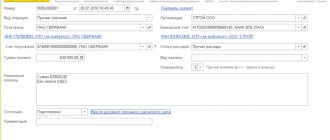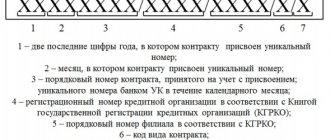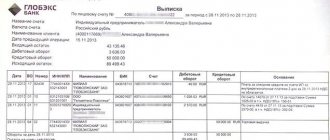Ratio of accrued and written off tax
The greatest suspicion is caused by taxpayers whose accounts are credited with a large number of payments with the allocation of VAT, while outgoing payments are made without tax . The Central Bank of the Russian Federation believes that this may indicate the receipt of an unjustified tax benefit.
Let's assume that the company is engaged only in activities subject to VAT. Accordingly, 100% of its debit turnover is taxable. Thus, the VAT share should be equal to 18 or 10% of revenues, depending on the applicable rate.
This is an ideal case, which rarely happens in practice. 70% of payments including VAT are credited to a company’s account , but it transfers less than 30% of payments including VAT , then this is a reason for suspicion. Such an organization will attract the attention of the servicing bank and will be subject to further analysis.
Accounting press and publications
“Tax Bulletin”, N 6, 2000
ABOUT CALCULATION OF VAT WHEN CARRYING OUT OPERATIONS
FINANCIAL AND CREDIT INSTITUTIONS
The activities of credit institutions are regulated by Federal Law No. 395-1 of December 2, 1990 “On Banks and Banking Activities” (hereinafter referred to as the Law on Banks).
According to Article 1 of the said Law, a credit organization is a legal entity that, in order to make a profit as the main goal of its activities, has the right to carry out banking operations on the basis of a license from the Bank of Russia.
At the same time, Article 5 of this Law sets out a list of banking operations and other transactions of a credit institution.
In accordance with paragraph "e" clause 1 of Article 5 of the Law of the Russian Federation dated December 6, 1991 N 1992-1 "On Value Added Tax", taking into account amendments and additions (hereinafter referred to as the VAT Law), banking transactions are not subject to VAT , with the exception of collection operations.
Since, according to the above Law on Banks, banking operations are carried out only by credit institutions on the basis of a license, this benefit applies only to the activities of credit institutions, as well as to the activities of non-bank credit institutions that have the right to carry out certain banking operations.
Based on Article 5 of the Law on Banks (taking into account subsequent amendments and additions), the following operations are considered to be banking transactions not subject to VAT:
attracting funds from individuals and legal entities to deposits (on demand and for a certain period);
placing the above raised funds on your own behalf and at your own expense;
opening and maintaining bank accounts for individuals and legal entities;
carrying out settlements on behalf of individuals and legal entities, including correspondent banks, on their bank accounts;
cash services for individuals and legal entities;
purchase and sale of foreign currency in cash and non-cash forms;
attraction of deposits and placement of precious metals;
issuance of bank guarantees.
The above banking operations are reflected in paragraph 12 of the State Tax Service of Russia Instruction No. 39 of October 11, 1995 “On the procedure for calculating and paying value added tax,” as amended and supplemented (hereinafter referred to as Instruction No. 39).
With the entry into force of the Federal Law of July 31, 1998 N 151-FZ “On Amendments and Additions to the Federal Law “On the Central Bank of the Russian Federation (Bank of Russia)” and the Federal Law “On Banks and Banking Activities”, the list of banking operations was supplemented with the following operation , as the implementation of money transfers on behalf of individuals without opening bank accounts (with the exception of postal transfers), which is also exempt from VAT.
In addition to the listed banking operations, a credit institution has the right to carry out the following transactions, which are subject to VAT:
issuance of guarantees for third parties providing for the fulfillment of obligations in monetary form;
acquisition of the right to demand from third parties the fulfillment of obligations in monetary form;
factoring and forfaiting operations;
leasing operations (except for payments to small enterprises);
trust management of funds and other property under agreements with legal entities and individuals (trust operations);
carrying out transactions with precious metals and precious stones in accordance with the legislation of the Russian Federation;
leasing premises to individuals and legal entities, including special premises or safes located in them for storing documents and valuables;
provision of consulting and information services.
However, the above list of banking transactions exempt from VAT and the list of transactions subject to this tax are not exhaustive.
Let's consider a number of examples that are most often encountered in the practical activities of banks when they carry out both preferential banking operations and transactions subject to VAT and causing certain difficulties.
When granting a loan, the bank charges the borrower a fee for opening and maintaining a loan account. Is this remuneration subject to VAT?
In addition, when carrying out operations related to the provision of a loan, the bank provides paid services to clients for the execution and extension of loan agreements, the execution and renewal of collateral agreements, as well as the execution of compensation agreements, the assignment of the right to demand the fulfillment of obligations in cash, consulting services on issues of money circulation and lending. Is the remuneration received by the bank subject to VAT?
In accordance with paragraph "e" clause 12 of Instruction No. 39, banking operations include the opening and maintenance of bank accounts for individuals and legal entities, including the associated paperwork. Therefore, the remuneration received by the bank for opening and maintaining a loan account is not subject to VAT.
As for the remuneration received by the bank for providing additional paid services for the preparation and extension of loan agreements, re-registration of collateral agreements, execution of an indemnity agreement, assignment of the right of claim, for the provision of consulting services on issues of money circulation and lending, it is subject to VAT.
In order to repay its debt under the deposit agreement, the bank transfers fixed assets to the enterprise (depositor) under an additional agreement. Are the indicated turnovers subject to VAT?
Under a bank deposit agreement, one party (the bank), having accepted the amount of money (deposit) received from the other party (depositor), undertakes to return the deposit amount and pay interest on it under the conditions and in the manner prescribed by the agreement. The bank's transfer of fixed assets to the depositor to terminate obligations under the deposit agreement can be made only on the basis of an additional agreement (compensation or novation) signed by the parties. In accordance with paragraph "e" clause 2 of Article 3 of the VAT Law, turnover on the transfer of goods (work, services) under an agreement on the provision of compensation or replacement of the original obligation that existed between the parties with another obligation between the same persons is subject to VAT. .
Thus, the transfer of fixed assets for the purpose of terminating obligations under a bank deposit agreement is subject to VAT from the bank in the generally established manner based on the value of the transferred fixed assets.
Bank “A” (borrower), in order to fulfill obligations under the interbank loan, cedes to bank “B” (lender) the claim on the loans in terms of the principal debt and uncollected interest belonging to the borrower on the basis of concluded loan agreements.
From the moment the right of claim is acquired, Bank B, in accordance with the accounting rules approved by the Bank of Russia, will accrue interest. When the borrower returns an amount exceeding that which was paid for the right to claim the loan with accrued interest, Bank B receives additional income.
Is income received by a bank subject to VAT?
In accordance with the VAT Law, banking transactions, including transactions for the provision of loans (credits), are exempt from payment of this tax.
The transfer of the right to demand from third parties the fulfillment of obligations in monetary form (assignment agreement) in accordance with the Law on Banks (as amended and supplemented) does not apply to banking operations, and therefore bank income from these transactions is subject to VAT.
Thus, if an assignment agreement is concluded between a bank and another organization - a new creditor in order to ensure the fulfillment of obligations under a bank loan agreement, according to which the borrower’s obligations must be fulfilled to another person, then by concluding the specified transaction (assignment agreement), the bank assigning the right of claim closes a loan agreement that underlies the assignment agreement. In this regard, funds received by the assignor bank under an agreement for the assignment (acquisition) of the right to claim from third parties to fulfill obligations in cash within the amount of the loan and interest due on it at the time of transfer of the right to claim are not subject to VAT.
The amount of excess income under the assignment agreement over the income of the assignor bank provided for in the original loan agreement at the time of transfer of the right of claim is included in the turnover subject to VAT.
The amount of income received by the bank acquiring the right of claim - the assignee (Bank "B"), under the specified transaction, in the form of the difference between the amount received from the borrower and the amount paid to the assignor bank (Bank "A"), is subject to VAT in a generally established manner. Obligations to the budget to pay VAT on the specified amount of income arise, under the accounting policy adopted for payment tax purposes, at the time of receipt of funds from the borrower.
The bank receives remuneration for:
— acceptance for examination of banknotes of foreign states, the authenticity of which is in doubt;
— exchange (conversion) of cash foreign currency of one foreign state for cash foreign currency of another foreign state;
— exchange of a payment banknote of a foreign state for payment banknotes of the same foreign state;
- replacement of a non-payment currency of a foreign state with a means of payment of the same state.
Is this remuneration subject to VAT?
The remuneration received by the bank for performing the above operations is not subject to VAT, since these operations relate to banking operations for opening and maintaining bank accounts of individuals and legal entities, operations for making settlements on behalf of these persons, as well as their cash services.
Is the object of taxation the income received by the bank when carrying out operations related to the issuance of statements of customer accounts, making copies of bank statements if they are lost, as well as operations to re-register accounts, write-offs from accounts and crediting funds to accounts?
In accordance with the Law on Banks, banking operations include the opening and maintenance of bank accounts of individuals and legal entities, including the associated paperwork, without which it is impossible to maintain client accounts in banks, including: debiting from accounts and crediting funds to accounts; accrual of interest on funds in accounts; issuing account statements; making copies (duplicates) from accounts; issuing certificates of availability of funds in accounts and other documents related to account management; re-registration of accounts; clarification (search) of funds from customer accounts; sending requests for transfer of amounts at the request of clients; change of conditions, cancellation and return of transfers; transfer of deposits to another bank. Therefore, income received by the bank during their implementation is not subject to VAT.
The bank transfers the option premium to the non-resident. Should the amount of this option premium be subject to VAT?
According to clause 5 of Article 7 of the VAT Law, in the event of the sale of goods (work, services) on the territory of the Russian Federation by foreign enterprises that are not registered with the tax authority, VAT is paid to the budget in full by Russian enterprises or other persons indicated by these foreign enterprises.
Based on the above, when concluding an option transaction with foreign organizations that are not registered with the tax authority, VAT is paid by the Russian organization (buyer of the option) on the amount of the premium transferred to the foreign organization (writer of the option).
Should VAT be imposed on income received by a bank from providing loans in precious metals, although according to Instruction of the State Tax Service of Russia dated October 11, 1995 N 39 “On the procedure for calculating and paying value added tax”, banking transactions, which include transactions on attracting deposits and placing precious metals?
In accordance with paragraph "e" paragraph 1 of Article 5 of the VAT Law, banking transactions are exempt from this tax, with the exception of collection operations.
At the same time, clause 7 of Bank of Russia Regulation No. 50 dated November 1, 1996 “On the performance of transactions with precious metals by credit institutions on the territory of the Russian Federation and the procedure for conducting banking transactions with precious metals” provides that banks have the right, along with the placement of precious metals on their own behalf and at its own expense in deposit accounts opened in other banks, provide loans also in precious metals.
Article 807 of the Civil Code of the Russian Federation (Civil Code of the Russian Federation) establishes that under a loan agreement, one party (the lender) transfers into the ownership of the other party (borrower) money or other things defined by generic characteristics, and the borrower undertakes to return the same amount of money (loan amount) to the lender ) or an equal number of other things he received of the same kind and quality.
Thus, any transactions, including transactions with precious metals, carried out within the framework of a loan agreement, do not fall under the current tax benefit provided for in paragraph 1 of Article 5 of the above-mentioned Law, since these transactions do not relate to banking.
In connection with the above, income received from the lending of precious metals is subject to VAT.
Should turnover on the sale of precious metals under a commission agreement be subject to VAT if the commission agent is an authorized commercial bank?
According to paragraph "c" clause 1 of Article 5 of the VAT Law, turnover on the sale of precious metals by a specially authorized commercial bank, as well as turnover of specially authorized commercial banks on the sale of precious metals in bullions, are exempt from this tax, provided that these bullions remain in one of the certified storage facilities.
Article 39 of the Tax Code of the Russian Federation (TC RF) establishes that the sale of goods, work or services by an organization or individual entrepreneur is recognized as the transfer on a reimbursable basis (including the exchange of goods, work or services) of ownership of goods, the results of work performed by one person for another person, the provision of paid services by one person to another person.
Articles 990 and 996 of the Civil Code of the Russian Federation determine that a commission agent, executing the instructions of the principal on his own behalf, but on the instructions of the principal and at his expense, does not become the owner of the goods received by the commission from the principal or purchased at the expense of the principal.
Therefore, turnover on the sale of precious metals to an authorized commercial bank, which is a commission agent and purchases precious metals for the principal and at the expense of his funds, is not subject to the above-mentioned benefit and, therefore, is subject to VAT.
Is an authorized commercial bank purchasing precious metals under a commission agreement for the principal and at his expense payer of VAT on the amount of remuneration received from the principal?
Income received by an authorized commission bank in the form of remuneration when performing transactions related to the acquisition of precious metals on its own behalf, but at the expense of the principal, is subject to VAT in accordance with paragraph 3 of Article 4 of the VAT Law.
Is a bank obliged to pay VAT if, as part of a mortgage lending program, it issued a loan to an individual, who then assigned the right of claim to another commercial bank under an assignment agreement?
The funds received under this agreement are equal to the amount due under the original mortgage.
In accordance with the VAT Law, banking transactions, including transactions for the provision of loans, are exempt from payment of this tax.
Transfer of the right to demand from third parties the fulfillment of obligations in monetary form (assignment agreement) in accordance with Federal Law dated 02/03/1996 N 17-FZ “On Amendments and Additions to the Law of the Russian Federation “On Banks and Banking Activities in the RSFSR” does not apply to banking operations , and therefore bank income from these transactions is subject to VAT.
Thus, if an assignment agreement is concluded between a bank and another organization - a new creditor in order to ensure the fulfillment of obligations under a bank loan agreement, according to which the borrower’s obligations must be fulfilled by another person, then by concluding the specified transaction (assignment agreement), the bank assigning the right of claim closes a loan agreement that underlies the assignment agreement. In this regard, funds received by the assignor bank under an agreement for the assignment (acquisition) of the right to claim from third parties to fulfill obligations in cash within the amount of the loan and interest due on it at the time of transfer of the right to claim are not subject to VAT.
The amount of excess income under the assignment agreement over the income of the assignor bank provided for in the original loan agreement at the time of transfer of the right of claim is included in the turnover subject to VAT.
Is the assignment of the right of claim (cession) subject to VAT after Federal Law No. 154-FZ introduced an amendment to paragraph 3 of Article 38 of the Tax Code of the Russian Federation related to the exclusion of property rights from the property?
According to civil law, the right (claim) belonging to the creditor (assignor) on the basis of an obligation may be transferred by him to another person (assignee) under a transaction (assignment agreement). These types of transactions act as ways to secure the obligations of the parties to the original agreement and do not change the essence of the agreement itself.
Therefore, the sale of receivables must be registered with the seller as repayment of receivables for goods supplied (work performed, services rendered).
The procedure for applying VAT when concluding transactions for the acquisition (assignment) of a claim is decided depending on the specific content (type) of a business transaction (contractual relationship) between those assigning and acquiring this claim.
Thus, if the assignment agreement is based on transactions exempt from VAT in accordance with current tax legislation, then funds received within the amount due under the original agreement are not subject to this tax. If the income under the assignment agreement exceeds the income provided for by the original agreement, the specified difference is subject to VAT in the prescribed manner.
If the assignment agreement is based on calculations for payment for goods (work, services) that are not exempt from VAT, then the taxable turnover of the parties to the agreement (assignor, assignee) is the entire cost of goods shipped (work performed, services rendered).
At the same time, when the assignor enterprise uses for taxation purposes the proceeds from the sale of goods (performance of work, provision of services) as they are shipped, taxation is carried out immediately upon shipment of goods (work, services) without reference to the fact of further repayment of receivables. However, if the receivables are sold at a higher cost, then at the time of concluding the assignment agreement, additional taxes must be paid on the excess amount.
In the case of determining the proceeds from the sale of goods (works, services) for payment, the receivables listed on the balance sheet of the assignor for goods shipped (work performed, services rendered) are subject to taxation in the amount and on the terms provided for by the original agreement, at the time the assignment agreement comes into force. If the receivables are sold at a higher value, then taxes must also be paid on the excess amount at the time payment is received.
The bank, on behalf of clients, makes payments using a modem connection. In this regard, the bank receives income for the installation and operation of the “Client - Bank” system, system software and personnel training.
What is subject to VAT when a bank carries out the above transactions?
In accordance with paragraph "e" paragraph 1 of Article 5 of the VAT Law, banking transactions are exempt from this tax, which include operations for cash services for individuals and legal entities, as well as settlements on behalf of these individuals.
Thus, making payments on behalf of clients, including using modem communications, is not subject to VAT.
As for bank services related to the installation and operation of the “Client - Bank” system, system software, and personnel training, they are not considered banking operations, and, therefore, the fee charged by the bank for these services is subject to VAT according to Article 3 of the above Law.
In accordance with paragraph "e" clause 12 of the Instruction of the State Tax Service of Russia dated October 11, 1995 N 39 “On Value Added Tax,” banking transactions exempt from VAT include transactions involving the placement of raised funds on one’s own behalf and at one’s own expense.
Which bank operations are eligible for this benefit?
In accordance with paragraph "e" paragraph 1 of Article 5 of the VAT Law, banking transactions are exempt from this tax, with the exception of collection operations.
Banking operations include transactions involving the placement of raised funds on one's own behalf and at one's own expense on the terms of repayment, payment, urgency, including: credit transactions with clients and operations to provide interbank credit, including an open credit line; deposits placed in other banks.
Should VAT be charged on funds received by a bank from its employees in order to reimburse its expenses for long-distance calls not related to the performance of their official duties?
In accordance with Article 4 of the VAT Law, turnover subject to this tax includes any funds received by enterprises if their receipt is associated with settlements for payment for goods (works, services).
Based on the foregoing, funds received by the bank from its employees in order to reimburse the bank’s expenses for long-distance calls not related to the performance of their official duties are subject to VAT.
(For the end see “Tax Bulletin”, No. 7, 2000)
Signed for seal by M.V. Maslennikov
24.05.2000
—————————————————————————————————————————————————————————————————— ———————————————————— ——
High-risk areas of activity
In addition, the Central Bank of the Russian Federation has identified a number of activities that, in its opinion, are the most risky. It is in them that various “VAT optimization” schemes are most often used.
The list includes the following types of activities:
- Wholesale:
- timber, building materials and sanitary equipment;
- grain, unprocessed tobacco, seeds and feed for farm animals;
- fish, crustaceans, molluscs.
- Transfers of funds in the areas:
- provision of freight transport services;
- construction;
- wholesale trade in scrap metal, including ferrous and non-ferrous metals;
- provision of personnel;
- trade in precious stones, metals and jewelry, including their scrap.
Transactions subject to value added tax for banks.
According to paragraph 7 of Article 149 of the Tax Code, the right to exempt any transactions from non-regional VAT does not apply when carrying out intermediary activities in the interests of another person on the basis of commission agreements, commission agreements or agency agreements.
All operations and transactions that banks can carry out that are not mentioned in Article 149 of the Tax Code are subject to VAT. Among them, the most common are the following:
— acquisition of the right to demand from third parties the fulfillment of obligations in monetary form (factoring, forfaiting, assignment)
— trust management of funds and other property under agreements with individuals and legal entities
— provision of physical units for rent. And legal Persons with special premises or safes located in them for storing documents and valuables
— leasing operations
— Providing consulting and information services
Collection is not exempt from VAT. The imposition of VAT on this operation is based on the fact that, unlike other banking services, collection as transportation has a real cost, which is subject to VAT under the Tax Code. However, there is a certain ambiguity in the situation with the taxation of VAT on collection services, which many banks use to minimize VAT payments. This duality lies in the fact that collection as the transportation of funds always ends with the recalculation of the brought funds to be accepted at the bank's cash desk for storage or credited to the client's account. Recalculation of funds is a cash service of banks and, in accordance with the Tax Code, is not subject to VAT.
Based on the explanatory letters of the Ministry of Finance and the Federal Tax Service, bank income in the form of commissions for the provision of services for the preparation of documents when applying for a loan, collection of documents, preparation of contracts and security documentation and similar services necessary for the bank to make a decision on granting a loan are subject to VAT. Transactions accompanied by the provision of services using bank cards, according to the tax authorities, are subject to value added tax. Among them are the following:
— provision of instructional materials in electronic form
— transfer of specialized software
— consultation by phone or email, i.e. consulting services provided as part of ensuring technological interaction between settlement participants.
— services for providing technological equipment with consumables and components
— maintenance services for ATM terminal devices, cash terminals, and other devices that provide management of clients’ financial resources using bank cards
— services for maintaining and ensuring the functioning of computer software
— support services for processing centers, software for ATMs
— other similar operations of banks and processing centers.
Transactions subject to VAT also include the operation of issuing the bank card itself for transfer to the client.
The following transactions are subject to taxation that, in the opinion of the tax authorities, are of a “consulting and informational” nature, such as:
— providing a certificate of the availability and status of a loan account at the client’s request
— providing a calculation of interest accrued in the past month at the client’s request
— changing lending parameters
— providing information about credit history and refinancing rate at the client’s request
The income that banks receive under a financing agreement for the assignment of the right of claim (factoring) is subject to value added tax either at the time of termination of the agreement or when the bank transfers the right of claim to another person. VAT is imposed on the sale by the new creditor (bank) that received the claim of other financial services related to the claims that are the subject of the assignment.
The bank's performance of the functions of a currency control agent for the transactions of its clients does not relate to banking operations. In this regard, services for performing these functions, including the preparation of a transaction passport, are subject to VAT in accordance with the general procedure.
Futures transactions with foreign currency, including the purchase and sale of currency and securities under forward, futures contracts, as well as options, regardless of the presence of actual delivery of financial assets, are not subject to VAT in accordance with Article 149 of the Tax Code, clause 12, clause 12 Exception ( taxed) constitute income from brokerage and intermediary services for such operations (clause 7 of Article 149 of the Tax Code)
What should banks do?
The Central Bank of the Russian Federation instructs credit institutions to monitor companies based on the specified criteria . If there are reasons to believe that they may underestimate VAT, banks must:
- Analyze the organization’s connections with other bank clients to whom they send funds. In this case, you should use the Methodological Recommendations of the Central Bank No. 18-MR dated July 21, 2021.
- Request from suspicious clients documents or copies thereof, which will confirm that they have paid VAT, or that they do not have to pay it.
The Central Bank recommends that banks, guided by the agreement, refuse service to clients if:
- they did not provide the requested documents;
- documents have been submitted, but there are doubts about their reliability;
- in the Unified State Register of Legal Entities there is an entry regarding the person regarding the unreliability of information in the register.
Useful information about bank accounts and their blocking:
Characteristics of operations of commercial banks subject to VAT
Commercial banks pay VAT based on the provisions of the Tax Code of the Russian Federation (Chapter 21). However, all operations that banks carry out in the course of their activities are divided into two parts .
1. Bank operations exempt from VAT. According to the current tax legislation of the Russian Federation, basic banking transactions are exempt from VAT (Article 149 of the Tax Code of the Russian Federation). In ch. 13 of this section provides a complete list of banking operations. However, in the context of considering VAT, it should be noted that collection services are excluded from the list of banking operations exempt from VAT.
2. Bank operations subject to VAT. Currently, banks, being universal financial and credit institutions, provide services and carry out transactions for which VAT exemption is not provided. These include:
- operations for the sale of property;
- sale of collateral in the event of failure by the borrower to fulfill the obligation secured by the collateral;
- forfaiting, factoring, leasing, trust operations;
- services for storing documents and valuables;
- provision of equipment for recalculation and determination of the authenticity of banknotes (when renting bank safes);
- consulting services;
- services for the provision of property for rent;
- certification of bank documents accompanying settlement and other transactions with clients: certification of payment documents with a bank seal;
- certification of a card with sample signatures and a bank client’s seal;
- maintaining registers of shareholders;
- depository services;
- other agency operations stipulated by contracts with individuals and legal entities.
It should be noted that exemption of banking operations from VAT is a right, not an obligation, of a commercial bank. In accordance with paragraph 5 of Art. 149 of the Tax Code of the Russian Federation, a bank may waive its right to non-pay VAT on banking transactions or suspend its use. To do this, the bank must inform the tax authorities of its decision by submitting a corresponding application no later than the first day of the year (tax period) from which it is expected to waive VAT benefits.
Refusal or suspension of VAT benefits is possible if the following conditions are met:
Did not you find what you were looking for?
Teachers rush to help
Diploma
Tests
Coursework
Abstracts
- corresponding actions apply to the full list of banking transactions exempt from VAT by law;
- the conditions for exemption or non-exemption from VAT apply to transactions with all bank clients, regardless of the nature of their activities and status;
- refusal to exempt bank operations from VAT is accepted for a period of at least one year.
An important feature of the VAT taxation of banks is the ability to choose one of the methods for calculating this tax.
The first option (special procedure) is the right, defined by law (clause 5 of Article 170 of the Tax Code of the Russian Federation), to transfer all VAT calculated on taxable transactions in full to the budget. At the same time, “input” VAT (VAT amounts paid to suppliers on purchased goods, works, services) should be included in the costs accepted for deduction when calculating income tax.
The second option is that in its accounting policy, the bank can provide for separate accounting of transactions subject to and not subject to VAT. In this case, the VAT deduction is determined in proportion to the share of taxable transactions (clause 4 of Article 170 of the Tax Code of the Russian Federation).
Banks, as a rule, prefer to establish a special procedure for calculating VAT in their accounting policies.
Bank services provided to organizations: with or without VAT?
Experts from the GARANT Legal Consulting Service help you understand issues related to the taxation of value added operations for the production and certification of copies of documents required to open a bank account, as well as when issuing cards with sample signatures.
The organization paid the bank for the services of making and certifying copies of documents required to open a bank account, as well as the services of issuing cards with sample signatures. The bank issued an invoice for the services provided with the allocated amount of VAT. Are these transactions subject to VAT? Can an organization deduct tax presented by a bank?
In our opinion, the organization has the right to deduct VAT presented by the bank in the cost of services for the production and certification of copies of documents necessary for opening a bank account, and the preparation of cards with sample signatures.
It should be noted that the issue related to the imposition of this tax on services for the production and certification of copies of documents necessary for opening a bank account, as well as services for issuing cards with sample signatures provided by credit institutions, is currently controversial.
Operations for the sale of goods (works, services) on the territory of the Russian Federation are recognized as subject to VAT (subclause 1, clause 1, article 146 of the Tax Code of the Russian Federation).
Article 149 of the Tax Code of the Russian Federation provides a list of transactions that are not subject to VAT (exempt from taxation).
So, in sub. 3 p. 3 art. 149 of the Tax Code of the Russian Federation provides that banking operations carried out by banks (with the exception of collection) are not subject to VAT (exempt from taxation) on the territory of the Russian Federation. At the same time, the list of banking transactions not subject to VAT, named in this subclause, is closed.
The list of banking operations is determined by Art. 5 of the Federal Law of December 2, 1990 No. 395-1 “On Banks and Banking Activities” and is closed.
Bank services for making and certifying copies of documents, issuing cards with sample signatures of officials and seal imprints are not included in the list of VAT-free banking transactions established in subparagraph. 3 p. 3 art. 149 of the Tax Code of the Russian Federation, and in accordance with Art. 5 of Federal Law No. 395-1 dated December 2, 1990 are not recognized as a banking operation.
Consequently, the bank’s services for making and certifying copies of documents, issuing cards with specimen signatures of officials and seal imprints are subject to VAT in the generally established manner.
A similar opinion is shared by the Russian Ministry of Finance, as well as the tax authorities (see letters of the Russian Ministry of Finance dated March 13, 2007 No. 03-07-05/10, Federal Tax Service of Russia dated May 17, 2005 No. MM-6-03/404, Ministry of Taxes of Russia dated May 13, 2004 No. 03-1-08/1191/15 and the Department of the Ministry of Taxes of Russia for Moscow dated August 27, 2004 No. 24-14/55637).
At the same time, there is another point of view on the issue under consideration.
Bank operations for opening and maintaining bank accounts for organizations and individuals, including bank accounts used for settlements with bank cards, as well as operations related to the servicing of bank cards, are not subject to VAT. This is indicated in sub. 3 p. 3 art. 149 of the Tax Code of the Russian Federation.
Clause 1.5 of the Central Bank of the Russian Federation Instruction No. 28-I dated September 14, 2006 “On opening and closing bank accounts, deposit accounts” (hereinafter referred to as Instruction No. 28-I) states that bank officials accept documents necessary for opening an account of the appropriate type, checking the proper execution of documents, the completeness of the information provided and its reliability in the cases and in the manner established by Instruction No. 28-I, based on the documents received, checking the client’s legal capacity (capacity), and also performing other functions provided for by the Instructions No. 28-I, banking rules and job descriptions.
In accordance with clause 1.11 of Instruction No. 28-I, in order to open a bank account, a deposit account, copies of documents certified in the manner established by the legislation of the Russian Federation are submitted to the bank.
In cases provided for in banking rules, documents submitted by a client - a legal entity when opening a bank account, deposit account, can be certified in the manner prescribed in subparagraph. 1.11.1 clause 1.11 of Instruction No. 28-I, documents submitted when opening a bank account, deposit accounts can be certified by a bank official (another person authorized by the bank) in the manner established by sub-clause. 1.11.2 clause 1.11 of Instruction No. 28-I.
According to clause 7.1 of Instruction No. 28-I, the card is drawn up on form No. 0401026 according to OKUD (All-Russian Classifier of Management Documentation OK 011-93), established by Appendix 1 to Instruction No. 28-I, and is submitted by the client to the bank in cases provided for by Instruction No. 28-I, along with other documents necessary for opening a bank account, deposit account.
Thus, a card with sample signatures and seal imprints is one of the main documents submitted by an organization to open a bank account.
Clause 7.13 of Instruction No. 28-I states that, as a general rule, a card with sample signatures can be certified either by a notary or by an authorized bank employee. Bank officials may be authorized to draw up, in the manner prescribed by clause 7.13 of Instruction No. 28-I, a card with sample signatures and seal impressions.
The client’s ability to notarize the authenticity of the signatures on the card with sample signatures and seal imprints, along with the ability to perform a similar procedure at the bank if the client applies for such a service directly to the bank, does not deprive this operation of the status of a banking service, since its provision is mandatory for the bank and is associated with the execution of an operation to open and maintain a client account, of which it is an integral and integral part (resolution of the Eighth Arbitration Court of Appeal dated November 19, 2009 No. 08AP-7282/2009).
Thus, the production and certification of copies of documents necessary for opening an account, as well as the bank’s certification of the authenticity of the signatures on the card with sample signatures and a seal imprint are considered mandatory when opening a bank account.
Services for the production and certification of copies of documents, services for issuing cards with sample signatures and seal imprints are not an independent service of the bank, but an integral part of the operation of opening and maintaining bank accounts of organizations and individuals, which, by virtue of the provisions of sub-clause. 3 p. 3 art. 149 of the Tax Code of the Russian Federation is not subject to VAT.
This point of view is also supported by arbitration courts (see decisions of the FAS Volga District dated July 14, 2009 No. A65-27027/2007, dated June 22, 2006 No. A65-23366/05-SA1-7, Ural District dated October 9, 2006 No. F09-8945 /06-C2 and the Eighth Arbitration Court of Appeal dated November 19, 2009 No. 08AP-7282/2009).
VAT deduction
Let us note that Chapter 21 of the Tax Code of the Russian Federation does not contain any restrictions regarding the deduction of “input” VAT on banking services.
The taxpayer can reduce the total amount of tax calculated in accordance with Art. 166 of the Tax Code of the Russian Federation, as established in Art. 171 of the Tax Code of the Russian Federation, tax deductions. Grounds - clause 1 of Art. 171 Tax Code of the Russian Federation.
An organization has the right to deduct “input” VAT if the following conditions are simultaneously met:
- purchased goods (work, services) are intended to carry out transactions subject to VAT (clause 2 of Article 171 of the Tax Code of the Russian Federation);
- goods (work, services) are accepted for accounting (clause 1 of article 172 of the Tax Code of the Russian Federation);
- there is a properly executed supplier invoice (clause 1 of article 172 of the Tax Code of the Russian Federation).
If the above conditions are met, the organization has the right to deduct VAT paid to the bank for the services of making and certifying copies of documents, as well as for issuing cards with sample signatures and seal impressions.
Accounting
Expenses associated with payment for services provided by credit institutions are recognized as other (clause 11 of PBU 10/99 “Organization’s expenses”). They are accepted for accounting in an amount calculated in monetary terms, equal to the amount of payment in cash and other forms or the amount of accounts payable (clauses 6 and 14.1 of PBU 10/99).
In accounting, the transaction associated with payment for bank services for the production and certification of copies of documents, as well as for the preparation of cards with sample signatures and seal imprints, is reflected as follows:
Debit 76 Credit 51
— funds are written off from the current account to pay for bank services;
Debit 91, subaccount 2 “Other expenses” Credit 76
— bank services are included in expenses;
Debit 19 Credit 76
— VAT presented by the bank is taken into account;
Debit 68 Credit 19
— VAT presented by the bank is accepted for deduction.









